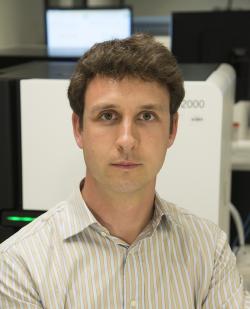Dr. Obi Griffith develops methods to tackle the interpretation bottleneck in cancer genomics, helping to bring precision oncology to the clinic. He is one 16 speakers that will present at the GSC’s 20th Anniversary Symposium, November 21, 2019.
 Dr. Obi Griffith first became interested in genomics and bioinformatics as an undergraduate student studying biology and biochemistry at the University of Winnipeg while working on a project investigating the c-value paradox. But his desire to apply his computation and programming skills to biological problem stemmed from his experiences with cancer in his family.
Dr. Obi Griffith first became interested in genomics and bioinformatics as an undergraduate student studying biology and biochemistry at the University of Winnipeg while working on a project investigating the c-value paradox. But his desire to apply his computation and programming skills to biological problem stemmed from his experiences with cancer in his family.
“I realized that cancer genomics could be one of the most powerful ways to improve cancer outcomes,” says Dr. Griffith, “Having had cancer in my family was a huge motivating factor.”
Following his undergraduate degree, Dr. Griffith joined the GSC, first as a computational biologist and then as a PhD student working under the supervision of Dr. Steve Jones. The bioinformatics training he received was instrumental for his career.
“The training at the GSC has contributed to my career trajectory in every way imaginable,” says Dr. Griffith, “Some of the projects in my lab today are the children or grandchildren of ideas we had while I was there.”
Dr. Griffith is now an Associate Professor of Medicine and Assistant Director of the McDonnell Genome Institute at Washington University School of Medicine. His current research uses bioinformatics and cancer genomics on a variety of cancer types with the goal of widening the “interpretation bottleneck”.
“You can generate large amounts of sequencing data from a patient’s tumour,” says Dr. Griffith, “But you run into this insurmountable problem of the hundreds of thousands of ways to interpret that data.”
His laboratory is working to improve the predictions that can be made about a tumour, and understanding how they can be better translated into the clinical setting. At the GSC’s upcoming 20th anniversary symposium, Dr. Griffith will present his work on developing machine learning approaches and standards to automate and improve the identification of genomic variants, development of expert-curated knowledgebases for clinical interpretation of these variants, and efforts to measure the impact of genomics in clinical decision-making for cancer patients.
Dr. Griffith’s career has been closely paralleled by that of his twin brother, Dr. Malachi Griffith. Growing up thinking they were fraternal twins gave them the freedom to explore their interests and passions without feeling the need to carve out separate identities. While they have since discovered they are actually identical, they continue to work together in a collaborative and fruitful scientific partnership.
“Having the same interests was an advantage from the very first day of undergraduate classes, sharing notes from class” says Dr. Griffith, “To literally today, when we were bouncing ideas of each other for our grant applications.”
Dr. Griffith has published over 100 papers on topics on many different cancer types and has received numerous research awards and honours. He was profiled as an “up and coming” investigator by Genome Technology Magazine and was included in Wired Magazine’s “smart list”.
Dr. Griffith is looking forward to reuniting with past and present GSC researchers and trainees, some of whom are now scientific collaborators, at the upcoming symposium.